Related Research Articles
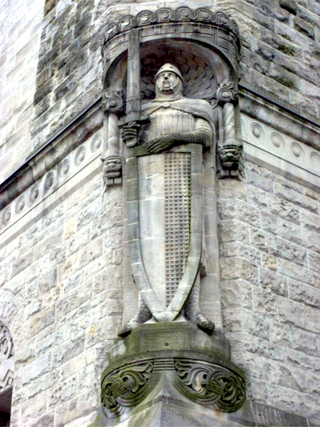
Roland was a Frankish military leader under Charlemagne who became one of the principal figures in the literary cycle known as the Matter of France. The historical Roland was military governor of the Breton March, responsible for defending Francia's frontier against the Bretons. His only historical attestation is in Einhard's Vita Karoli Magni, which notes he was part of the Frankish rearguard killed in retribution by the Basques in Iberia at the Battle of Roncevaux Pass.
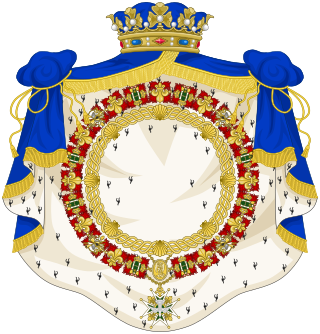
The Peerage of France was a hereditary distinction within the French nobility which appeared in 1180 during the Middle Ages.

The chanson de geste is a medieval narrative, a type of epic poem that appears at the dawn of French literature. The earliest known poems of this genre date from the late 11th and early 12th centuries, shortly before the emergence of the lyric poetry of the troubadours and trouvères, and the earliest verse romances. They reached their highest point of acceptance in the period 1150–1250.
Doon de Mayence also known as Doolin de Maience, Doon de Maience or Doolin de Mayence was a fictional hero of the Old French chansons de geste, who gives his name to the third cycle of the Charlemagne romances dealing with the feudal revolts.
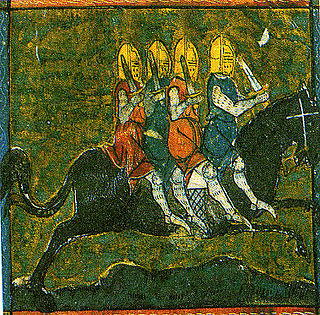
Bayard is a magical bay horse in the legends derived from the medieval chansons de geste. These texts, especially that of The Four Sons of Aymon, attribute to him magical qualities and a supernatural origin. He is known for his strength and intelligence, and possesses the supernatural ability to adjust his size to his riders.

Renaudde Montauban was a legendary hero and knight which appeared in a 12th-century Old French chanson de geste known as The Four Sons of Aymon. The four sons of Duke Aymon are Renaud, Richard, Alard and Guiscard, and their cousin is the magician Maugris. Renaud possesses the magical horse Bayard and the sword Froberge.

Valentine and Orson is a romance which has been attached to the Carolingian cycle.
The Matter of France, also known as the Carolingian cycle, is a body of literature and legendary material associated with the history of France, in particular involving Charlemagne and his associates. The cycle springs from the Old French chansons de geste, and was later adapted into a variety of art forms, including Renaissance epics and operas. Together with the Matter of Britain, which concerned King Arthur, and the Matter of Rome, comprising material derived from and inspired by classical mythology, it was one of the great European literary cycles that figured repeatedly in medieval literature.

In the 11th century Matter of France, Ganelon is the knight who betrayed Charlemagne's army to the Saracens, leading to the 778 Battle of Roncevaux Pass. His name is said to derive from the Italian word inganno, meaning fraud or deception. He is based upon the historical Wenilo, the archbishop of Sens who betrayed King Charles the Bald in 858.
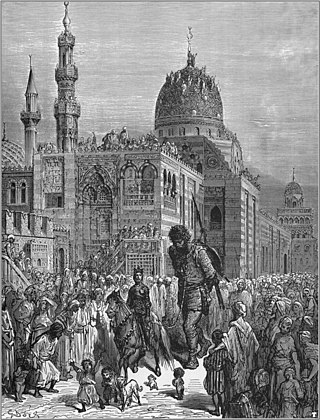
Astolfo is a fictional character in the Matter of France where he is one of Charlemagne's paladins. He is the son of Otto, the King of England, and is a cousin to Orlando and Rinaldo, and a descendant of Charles Martel. While Astolfo's name appeared in the Old French chanson de gesteThe Four Sons of Aymon, his first major appearance was in the anonymous early fourteenth-century Franco-Italian epic poem La Prise de Pampelune. He was subsequently a major character in Italian Renaissance romance epics, such as Morgante by Luigi Pulci, Orlando Innamorato by Matteo Maria Boiardo, and Orlando Furioso by Ludovico Ariosto.

Medieval French literature is, for the purpose of this article, Medieval literature written in Oïl languages during the period from the eleventh century to the end of the fifteenth century.

Maugris or Maugis was one of the heroes of the chansons de geste and romances of chivalry and the Matter of France that tell of the legendary court of King Charlemagne. Maugis was cousin to Renaud de Montauban and his brothers, son of Beuves of Aygremont and brother to Vivien de Monbranc. He was brought up by Oriande the fairy, and became a great enchanter. He won the magical horse Bayard and the sword Froberge which he later gave to Renaud.
Naimon, Duke of Bavaria, also called Naimes, Naime, Naymon, Namo, and Namus, is a character of the Matter of France stories concerning Charlemagne and his paladins, and appears in Old French chansons de geste and Italian romance epics. He is traditionally Charlemagne's wisest and most trusted advisor.
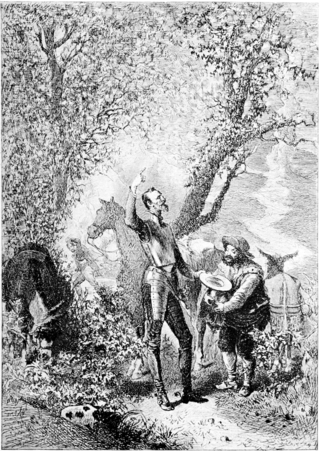
Mambrino was a fictional Moorish king, celebrated in the romances of chivalry. His first appearance is in the late fourteenth-century Cantari di Rinaldo, also known as Rinaldo da Monte Albano, Rinaldo Innamorato or Innamoramento di Rinaldo. The Cantari di Rinaldo is an adaptation of the Old French chanson de geste, Renaud de Montauban, also known as Les Quatre Fils Aymon. In the Old French, Renaud defeats the Saracen king Begon, who was invading King Yon's kingdom of Gascony. The Italian replaces Begon with Mambrino, and furnishes him with an elaborate backstory. In the Cantari, Mambrino is one of six brothers, all giants. Four of the brothers had been decapitated by Rinaldo on various occasions earlier in the poem, so that his invasion of Gascony was motivated by his desire for vengeance. Rinaldo, as the Italians called Renaud, wins the war by defeating Mambrino in single combat and decapitating him as well. Mambrino's helmet, in this poem, has for its crest an idol which is so constructed that whenever the wind blows through it, it says, "Long live the most noble lord Mambrino, and all his barons."

Fierabras or Ferumbras is a fictional Saracen knight appearing in several chansons de geste and other material relating to the Matter of France. He is the son of Balan, king of Spain, and is frequently shown in conflict with Roland and the Twelve Peers, especially Oliver, whose prowess he almost rivals. Fierabras eventually converts to Christianity and fights for Charlemagne.
Alard may refer to:

The Paladins, also called the Twelve Peers, are twelve legendary knights, the foremost members of Charlemagne's court in the 8th century. They first appear in the medieval chanson de geste cycle of the Matter of France, where they play a similar role to the Knights of the Round Table in Arthurian romance. In these romantic portrayals, the chivalric paladins represent Christianity against a Saracen (Muslim) invasion of Europe. The names of the paladins vary between sources, but there are always twelve of them led by Roland. The paladins' most influential appearance is in The Song of Roland, written between 1050 and 1115, which narrates the heroic death of Roland at the Battle of Roncevaux Pass.

The Four Sons of Aymon, sometimes also referred to as Renaud de Montauban is a medieval tale spun around the four sons of Duke Aymon: the knight Renaud de Montauban, his brothers Guichard, Allard and Richardet, their magical horse Bayard, their adventures and revolt against the emperor Charlemagne. The story had a European success and echoes of the story are still found today in certain folklore traditions.

Reinold was a Benedictine monk who lived in the 10th century. Supposedly a direct descendant of Charlemagne, and the fourth son mentioned in the romantic poem Duke Aymon, by William Caxton. The poem is Caxton's translation of the long French Chanson de Geste, Les Quatre Fils Aymon, where Renaud de Montauban dies in an almost identical manner. He began his religious life by entering the Benedictine monastery of Pantaleon in Cologne, Germany, where he was appointed head of a building project occurring in the abbey. He often joined the stonemasons in their work, at times surpassing them. This led to the unsavoury event of his murder at the hands of the same stonemasons he worked with. Reinold was beaten to death with hammers and his body deposited into a pool near the Rhine. His body was later found through divine means, leading to the attribution of Reinold as the Patron of Stonemasons.
Cortain is a legendary short sword in the legend of Ogier the Dane. This name is the accusative case declension of Old French corte, meaning "short".
References
- ↑ Church, Alfred John (1904). Stories of Charlemagne and the Twelve Peers of France: From the Old Romances. Macmillan.